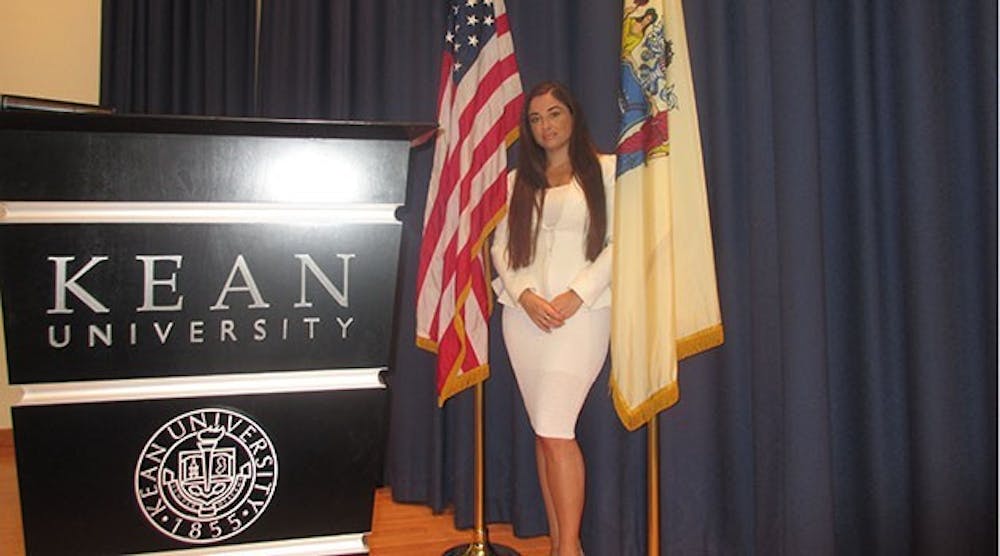Jasmine Rand, esquire of the Trayvon Martin case and founder of RAND LAW, L.L.C.
Photo Credit: Marlon Ramtahal l The Cougar's Byte
In today’s world, social justice is something that most people yearn for. Despite a person’s origin, ethnicity, or gender, people fall victim to judgment based on their appearance and status in society. Jasmine Rand, esquire of the Trayvon Martin case and founder of RAND LAW, L.L.C., came to the Science, Technology, Engineering, and Mathematics (STEM) Lecture Hall on Tuesday, April 28, 2015, from 10 a.m. to 11 a.m. to address the students of the Kean community on social equality and diversity. Serving as an inspirational speaker, she spoke of the importance of diversity and how it can play a major intake on people’s social well-being and status. She is a champion for civil and human rights and also a professor, national legal analyst, international legal consultant, lecturer, and columnist.
Kean University President Dawood Farahi introduced the event by welcoming the faculty, students, and staff members. Farahi stated, “30% of learning is done in classrooms, while the rest is done through research activities and interactions with others.” Since the event was hosted by the office of research and sponsored programs, the president made it clear that it is through research that students learn the most and can make the most out of their learning experiences.
As Rand took the stage, she explained who she was, her legal and practical experiences, and media portraying certain aspects of culture and international movements. By demonstrating what it is like to be an African American living in society, she makes it clear that repeated acts of violence against black males have affected the nation deeply and profoundly. “The onslaught portrayed in the social media of the deprivation of black male lives is something that is very difficult for us to watch and see. Black life has systemically devalued to the point where it plays a huge toll on our legal system and throughout society,” stated Rand. She said that when individuals watch certain events similar to the Trayvon Martin situation, they can easily become disturbed on how cruel and unjust the world can be. “I think [Trayvon Martin’s case] started a whole new movement. When we have a nation discussing race relations [and] gun control and having an active community to protest, I think we have to acknowledge all the protests that have been made in a positive way. We can’t just focus on the negatives that we are seeing and we can’t ignore it either, we have to live with it and deal with it directly. ”
Rand’s delivery on the media certainly shaped many of the audience’s opinion. She states, “the media is one of the most powerful tools to create social change because often, people who work in the human and civil rights field do not really have a lot of money and are not given billions of dollars to do what we do. So, the media is a cheap and affordable way to get out the message, especially social media because it helps engage our youth,” said Rand.
From the time Rand was 10 years old, she was obsessed with learning about the Holocaust and what motivated human beings to cruelly destroy others. By striving to understand the genocide and make means of it, she became inspired to become a lawyer who would be able to help people overcome oppression and hardships. “At the core of who I am is a great love I have for other people,” Rand said. She made it clear that when she was younger, she would enjoy history class because she treated world history as if it was her own history, or in other terms, world history is everybody’s history and all can benefit from it if handled correctly.
When people grow up in a multicultural setting, Rand believes diversity can serve as a key component to strengthening their ability to learn about the world. “It’s not about punishing people for doing bad acts that drives me, but it is trying to create a better space for the people I love and a world in which people can enjoy the same equality and have the same kind of opportunities that I have had.”
Charankamal Kaur, a junior English writing major, was one of the audience members who became moved by the speaker’s message. Kaur said, “getting advice from one of the top attorneys in the country is such a privilege. I just couldn't miss out on this event. She is a representation of what I hope to be one day.”
In the middle of Rand’s speech, she quoted Nelson Mandela’s most well-known line, “don’t judge me by my successes, judge me by how many times I fell down and got back up again.” Kaur said, “this quote really touched me because even after all of her struggles, she still became who she wanted to be. After getting rejected from almost all law schools…[and when she reapplied]…she got rejected [again]. But her willingness and determination never went away…This really motivates and inspires me to keep trying. Even if I fail, it is not the end of the world.”

Jasmine Rand, esquire of the Trayvon Martin case and founder of RAND LAW, L.L.C.
Photo Credit: Marlon Ramtahal l The Cougar's Byte



